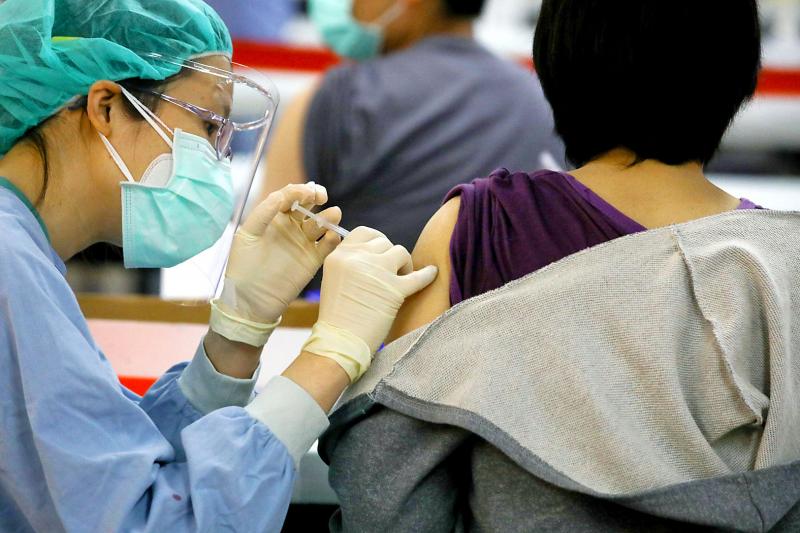Sustained domestic transmission of SARS-CoV-2 would worsen COVID-19-pandemic-related losses for Taiwan’s non-life insurers this year and end the sector’s 21-year profit streak, Taiwan Ratings Corp (中華信評) said yesterday.
The sector is likely to report an overall underwriting loss this year due to COVID-19 coverage, thus terminating the sector’s long profitable streak, the local arm of S&P Global Ratings said.
“We see considerable uncertainty over the potential claims facing non-life insurers,” Taiwan Ratings credit analyst Patty Wang (王珮齡) said, adding that heavy losses seem likely and could negatively affect capitalization for insurers without proper capital restoration plans.

Photo: Cheng I-hwa, Bloomberg
The risks are particularly evident for insurers with the greatest number of outstanding pandemic policies, Wang said.
The biggest uncertainty insurers face is how many policyholders are infected before their pandemic policies mature, and whether regulators would downgrade the status of the Omicron variant of SARS-CoV-2 as a reportable transmissible disease, which would reduce the required payout, she said.
Though local insurers have sufficient liquidity to withstand the potential outflows from pandemic insurance claims, adequate capital planning would become increasingly important for players with large pandemic insurance exposures and those with insufficient capital strength, Wang said.
Taiwan’s non-life insurers generally have a smaller capital base than life and non-life insurers overseas, she said.
“While most Taiwanese non-life insurers have sufficient risk controls, as well as a manageable risk appetite, some companies still display the need to step up their risk framework and discipline, as the pandemic lesson revealed,” Wang said.
Local non-life insurers by and large have sufficient reinsurance coverage for their catastrophe risk exposure and have put up decent showings from their non-pandemic business lines, Wang said.

Intel Corp chief executive officer Lip-Bu Tan (陳立武) is expected to meet with Taiwanese suppliers next month in conjunction with the opening of the Computex Taipei trade show, supply chain sources said on Monday. The visit, the first for Tan to Taiwan since assuming his new post last month, would be aimed at enhancing Intel’s ties with suppliers in Taiwan as he attempts to help turn around the struggling US chipmaker, the sources said. Tan is to hold a banquet to celebrate Intel’s 40-year presence in Taiwan before Computex opens on May 20 and invite dozens of Taiwanese suppliers to exchange views

Application-specific integrated circuit designer Faraday Technology Corp (智原) yesterday said that although revenue this quarter would decline 30 percent from last quarter, it retained its full-year forecast of revenue growth of 100 percent. The company attributed the quarterly drop to a slowdown in customers’ production of chips using Faraday’s advanced packaging technology. The company is still confident about its revenue growth this year, given its strong “design-win” — or the projects it won to help customers design their chips, Faraday president Steve Wang (王國雍) told an online earnings conference. “The design-win this year is better than we expected. We believe we will win

Quanta Computer Inc (廣達) chairman Barry Lam (林百里) is expected to share his views about the artificial intelligence (AI) industry’s prospects during his speech at the company’s 37th anniversary ceremony, as AI servers have become a new growth engine for the equipment manufacturing service provider. Lam’s speech is much anticipated, as Quanta has risen as one of the world’s major AI server suppliers. The company reported a 30 percent year-on-year growth in consolidated revenue to NT$1.41 trillion (US$43.35 billion) last year, thanks to fast-growing demand for servers, especially those with AI capabilities. The company told investors in November last year that

Power supply and electronic components maker Delta Electronics Inc (台達電) yesterday said it plans to ship its new 1 megawatt charging systems for electric trucks and buses in the first half of next year at the earliest. The new charging piles, which deliver up to 1 megawatt of charging power, are designed for heavy-duty electric vehicles, and support a maximum current of 1,500 amperes and output of 1,250 volts, Delta said in a news release. “If everything goes smoothly, we could begin shipping those new charging systems as early as in the first half of next year,” a company official said. The new